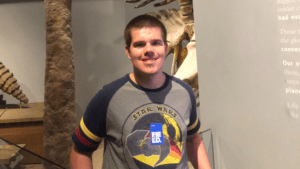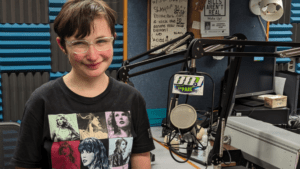This guest post is by Daniel Dickson a young man on the autism spectrum who has been accepted into Liberty University, studying information technology. Daniel is applying for the Spring 2020 Making a Difference Autism Scholarship via the nonprofit KFM Making a Difference started by me, Kerry Magro. I was nonverbal till 2.5 and diagnosed with autism at 4 and you can read more about my organization here. Can I ask for a favor? I’m trying to make this nonprofit self-sufficient so I can make this my full-time job supporting the special needs community and would appreciate you taking a minute before reading on to watch this video below and subscribing to our Youtube page here to get to learn more about the work we do in the community.
I hope you can support my nonprofit like I’m trying to support these students with scholarship aid for college. Learn more on how you can help our cause with a small donation (just asking for $3 today, equal to your daily cup of coffee) here.
When I was first diagnosed with autism (ASD), my parents were told that I could not mentally progress past the age of four, regardless of what we could have done to treat this disorder. If this prediction had been true, I would not have been able to develop enough to complete even basic tasks such as simple mathematics. Although my family initially believed that there was no feasible way to prevent this from occurring, the effects of ASD were markedly reduced through years of therapy, education, and discipline. Despite the diagnosis I was given at a young age, this process has greatly enhanced my mental development and allowed me to excel at my studies in game design. My hope is that other aspiring developers who may also have ASD learn from this experience to develop similar success, striving to improve their skills, alleviating fears or unhealthy habits, and ensuring that circumstances and emotions do not immobilize creative growth and passion.
Although ASD has not affected me enough to majorly impact my education, I sometimes overthink concepts which should be rather easy to understand, often causing me to complete tasks much later than intended. Developers with this disorder may imagine a new videogame mechanic or story that few other people have made before, yet that person may later become hyperactive and lose track of how they should implement this feature. If these ideas are not properly documented, they may be forgotten and replaced with more generic concepts, which could impact their games’ critical reception and sales. To further enhance their skills and maximize their games’ performance, developers should regularly seek guidance from colleagues to ensure that development is proceeding as intended, especially if they have significant trouble with ASD.
When conversing with other people verbally instead of through online communication, I also sometimes begin pausing, stuttering, or taking too much time to consider how I should respond or absorb new information. Sometimes, I will start planning how I should address a specific subject or task, only to discover that I was unknowingly thinking aloud. This habit has plagued my youth, and developers who do not properly address such problems will suffer from reduced communication skills and risk having their story publicized prematurely. If a developer loses track of their thoughts, they may also give responses that are either ineffective or unrelated to their conversations, which could inhibit development and technical support. For these reasons, it is important for developers to know if it would be better for them to work in person or through an online medium, where they will have more time to consider how they should respond to different situations.
Perhaps most importantly, developers should search for workplaces that are willing to accept adaptability, flexibility, and skill. Game designers with ASD will likely have trouble adapting to a new workplace if their procedures and guidelines are too rigid. In addition, individuals with ASD would struggle with companies that claim to support developers on every level, only to impose unrealistic deadlines that only encourage them to rush their products without considering how they should be organized. These policies, which could only be compounded by many major publishers’ interest in forceful “pay to win” mechanics, would intensify many developers’ problems with ASD and may even cause new disorders to develop. To prevent situations such as these, developers should create a list of potential organizations where they may want to work, carefully study where they place their focus, and decide which environment would be most capable of supporting their skillset and channeling their full potential in the world of videogame development.

Follow my journey on Facebook, my Facebook Fan Page, & Instagram!
My name is Kerry Magro, a professional speaker and best-selling author who is also on the autism spectrum that started the nonprofit KFM Making a Difference in 2011 to help students with autism receive scholarship aid to pursue a post-secondary education. Help support me so I can continue to help students with autism go to college by making a tax-deductible donation to our nonprofit here.














